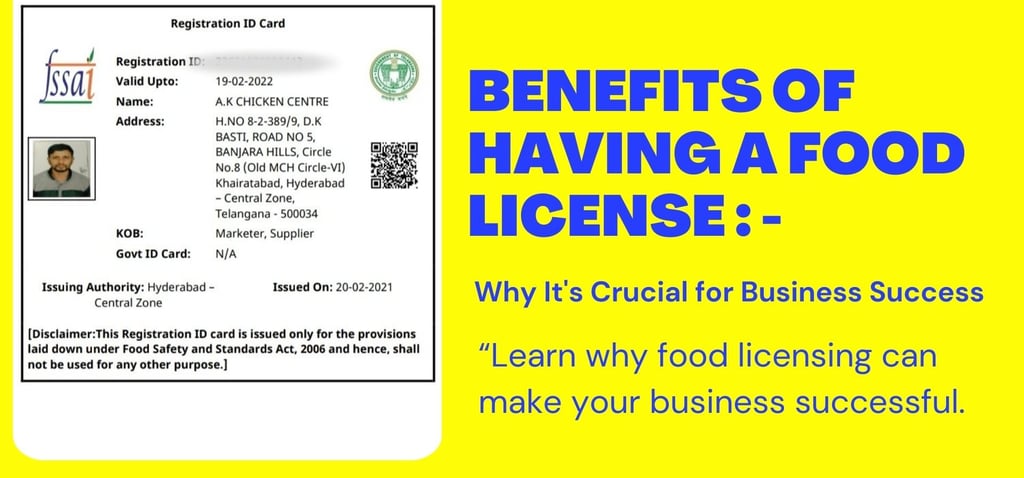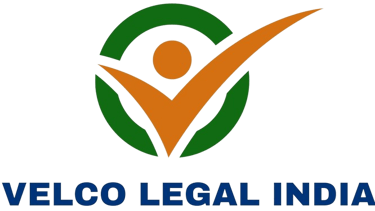The Crucial Benefits of Having a Food License: A Key to Business Success
7/20/20247 min read


Introduction to Food Licensing
Food licensing is an essential regulatory measure designed to ensure that food businesses operate within the parameters of safety and hygiene standards. At its core, a food license is a legal authorization granted by governmental or regulatory bodies, allowing businesses to produce, handle, and sell food products. This license serves as a verification that the business complies with the established food safety regulations, which are crucial for protecting public health.
There are various types of food licenses, each tailored to specific aspects of the food industry. These can range from manufacturing and processing licenses to retail and catering permits. For instance, a restaurant might require a different type of license compared to a food manufacturing plant. This differentiation ensures that the specific risks and requirements of each sector are adequately addressed.
The process of obtaining a food license typically involves several steps. Initially, a business must submit an application to the relevant regulatory authority, which often includes detailed information about the business operations, facilities, and food safety protocols. This is usually followed by an inspection of the premises to assess compliance with hygiene and safety standards. If the business meets the necessary criteria, the authority will issue the food license, which must be renewed periodically to ensure ongoing compliance.
The legal and regulatory landscape surrounding food licensing is complex and varies by region. However, the overarching goal is to safeguard public health by ensuring that food products are safe for consumption. Food licensing is a critical component of broader food safety regulations, which encompass everything from ingredient sourcing and storage to preparation and distribution. By obtaining a food license, businesses not only demonstrate their commitment to quality and safety but also build trust with consumers and regulatory bodies.
Ensuring Compliance with Health and Safety Standards
Acquiring a food license is pivotal for any food-related business, as it mandates strict adherence to health and safety standards. These licenses ensure that businesses implement and maintain rigorous hygiene practices, which are essential in protecting consumer health. By securing a food license, a business commits to following standardized procedures for food handling, storage, and preparation, thereby minimizing the risk of contamination and foodborne illnesses.
Food licenses require businesses to adhere to specific guidelines regarding the cleanliness of the premises. This includes regular sanitization of surfaces, proper waste disposal, and the use of clean and safe equipment. Such practices are not only vital for maintaining a healthy environment but also play a significant role in preventing cross-contamination and the spread of pathogens. Proper food storage, another critical aspect enforced by food licenses, ensures that ingredients are kept at appropriate temperatures to prevent spoilage and bacterial growth.
Regular inspections and audits are integral components of the food licensing process. These evaluations are conducted by health authorities to ensure ongoing compliance with health and safety standards. Inspections typically cover various aspects, including the condition of the kitchen, the hygiene practices of staff, and the overall operational procedures. Regular audits serve as a proactive measure, identifying potential issues before they become significant problems, thus safeguarding consumers and reinforcing the business’s commitment to quality and safety.
The benefits of maintaining compliance with food safety standards extend beyond consumer protection. Adherence to these regulations enhances the business’s reputation, fostering trust and loyalty among customers. A strong reputation for food safety can differentiate a business in a competitive market, attract more clientele, and ultimately contribute to long-term success. By prioritizing health and safety through proper licensing, businesses not only fulfill regulatory requirements but also demonstrate a dedication to excellence and consumer well-being.
Building Consumer Trust and Confidence
Securing a food license is more than just a regulatory requirement; it is a strategic move that bolsters consumer trust and confidence. From a psychological standpoint, consumers are naturally inclined to trust establishments that visibly display their adherence to food safety standards. This trust is further reinforced by the knowledge that licensed businesses have undergone rigorous inspections and comply with health regulations designed to ensure food safety and quality.
Practically, being a licensed food business translates into tangible benefits. According to a study conducted by the National Restaurant Association, 75% of consumers reported that they are more likely to frequent a restaurant that visibly displays its food safety certifications. This statistic underscores the direct correlation between food licensing and consumer patronage. Moreover, licensed establishments often boast higher customer satisfaction rates. A survey by Food Safety Magazine revealed that 68% of customers associate a food license with higher quality standards and better service, leading to increased customer loyalty.
Case studies further illustrate the impact of food licensing on business success. For example, a popular café chain reported a 20% increase in repeat customers after prominently displaying their food license. Similarly, a food truck operator saw a significant rise in positive customer reviews and overall sales after obtaining and showcasing their food safety certification. These real-world examples highlight the practical advantages of being a licensed food business.
In essence, a food license serves as a badge of credibility and assurance for consumers. It signifies a commitment to maintaining high standards of food safety and quality, which in turn fosters consumer trust and confidence. By prioritizing food licensing, businesses not only comply with legal requirements but also create a solid foundation for long-term customer relationships and business success.
Legal Protection and Risk Management
Acquiring a food license is not merely a bureaucratic necessity; it serves as a crucial shield offering extensive legal protection to businesses. The possession of a food license ensures that a business operates within the legal framework established by local, state, and federal authorities. This legal compliance safeguards businesses from severe penalties and repercussions that can arise from non-compliance. Operating without a food license can result in hefty fines, business shutdowns, and even legal liability in the event of foodborne illnesses. The financial and reputational damage from such legal consequences can be devastating, making the acquisition of a food license an essential aspect of risk management.
Without a food license, businesses expose themselves to significant legal risks. Regulatory bodies conduct regular inspections to ensure that food establishments adhere to safety and hygiene standards. Failure to meet these requirements can lead to immediate closures, fines, and legal action. A food license serves as proof that a business complies with these stringent standards, thereby reducing the risk of legal infractions. It also demonstrates a commitment to public health and safety, which can enhance a business's reputation among consumers.
Furthermore, having a food license is a proactive measure in risk mitigation. It ensures that businesses are prepared to handle any legal challenges that may arise. In the event of a foodborne illness outbreak, a licensed business is better positioned to demonstrate adherence to safety protocols, potentially reducing liability. This preparedness can be critical in defending against lawsuits and maintaining consumer trust. Additionally, a food license often necessitates regular training and updates on food safety practices, which further equips businesses to manage and mitigate risks effectively.
In essence, a food license is an indispensable asset for any food-related business. It provides a protective legal barrier, ensures compliance with regulatory standards, and enhances the business's ability to manage risks. By securing a food license, businesses not only protect themselves from potential legal repercussions but also build a solid foundation for long-term success and sustainability.
Market Access and Expansion Opportunities
Securing a food license is not just a regulatory requirement but a gateway to numerous market opportunities and business expansion. For food businesses, having a food license significantly enhances credibility, making it easier to gain access to lucrative markets. Retail chains, known for their stringent quality standards, often mandate that suppliers possess a valid food license. This requirement ensures that only businesses adhering to high safety and hygiene standards are part of their supply chain, thus, a food license becomes a ticket to entering these high-volume sales channels.
Moreover, a food license can open doors for export opportunities. International markets have strict compliance standards, and a food license from a recognized authority can facilitate the process of meeting these regulations. Exporting to other countries not only increases revenue streams but also boosts brand recognition on a global scale. Businesses with a food license are perceived as trustworthy and reliable, which can attract international buyers and partners.
Partnerships with other licensed entities are another significant advantage. Collaborating with other licensed businesses, be it suppliers, distributors, or even corporate clients, often requires mutual assurance of compliance with food safety regulations. A food license provides this assurance, fostering partnerships that can lead to business growth and innovation.
Additionally, participating in food-related events, festivals, and trade shows often necessitates a food license. These events are platforms for showcasing products to a broader audience, including potential customers, investors, and business partners. A food license not only ensures participation but also adds a layer of trust and quality assurance that can attract more interest and opportunities.
In essence, obtaining a food license is a strategic move that facilitates entry into new markets and supports business expansion. It serves as a mark of quality and compliance, essential for establishing credibility and accessing a wider array of business opportunities.
Conclusion: The Path to Long-term Success
Obtaining a food license is undeniably more than a regulatory obligation; it is a strategic investment that can pave the way for long-term business success. As discussed, the benefits of holding a food license extend far beyond mere compliance. It ensures operational integrity, fosters consumer confidence, and opens doors to new market opportunities.
Firstly, the rigorous processes involved in acquiring and maintaining a food license guarantee that food safety standards are met, minimizing the risk of foodborne illnesses. This not only protects the health of consumers but also shields the business from potential legal repercussions and financial losses due to negligence.
Secondly, a food license serves as a mark of credibility and trustworthiness. In an industry where reputation is paramount, being a licensed food establishment can significantly enhance your brand image. Customers are more likely to trust and patronize businesses that prioritize regulatory compliance and food safety, leading to increased customer loyalty and repeat business.
Moreover, having a food license can expand your business horizons. Many suppliers, distributors, and business partners prefer to work with licensed establishments, knowing that they adhere to high standards of quality and safety. This can lead to beneficial partnerships and increased access to resources that are critical for business growth and sustainability.
In conclusion, investing in a food license is a proactive step towards securing your business's future. It is an essential component of a successful food operation, providing a foundation of safety, trust, and opportunities. Business owners should recognize the holistic benefits of being a licensed food establishment and view it as a vital part of their long-term strategy for growth and success. By maintaining compliance and prioritizing food safety, businesses can build a lasting, positive reputation in the competitive food industry.
Velco Legal India
+91 7300003182 / +91 7300003184
Disclaimer: This website is a property of a consultancy firm, providing consultancy services w.r.t. Food License.
We expressively declare that we are private consultants. © 2022 velcolegalindia.com - All Rights Reserved.
